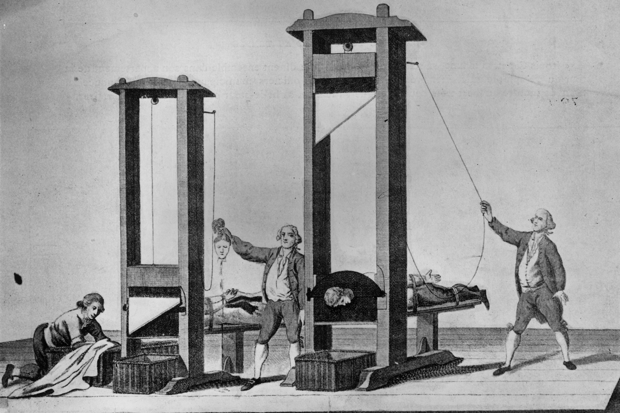Nice to know, isn’t it, that public attitudes are finally catching up with MPs’? It seems, from the Social Attitudes survey, that finally, half a century after parliament suspended the death penalty, 48 per cent of people no longer want the death penalty reintroduced. Opinion has been stubbornly in favour of it ever since 1965, and that was also true in 1998 when the Human Rights Act forbade capital punishment outright. In other words, until now, MPs have been wildly at odds with the opinion of most voters on an undeniably important issue.
I’m unsure exactly where I stand on the issue myself, though I’ve always felt the guillotine would have been my own choice of method if it came to it. I’m instinctively squeamish about state executions, though I’m sympathetic to the case for executing police killers. In fact the case for and against has rarely been better put than in Dead Man Walking – that movie with Susan Sarandon as a nun with a mission to death row – where the grimness of the execution was paralleled by matching footage of the murder that elicited the sentence. It was miles more powerful than what would have been the British equivalent: a one-sided depiction of the horror of the lethal injection.
But the point is that MPs have not just been apologetically at odds with public opinion on this one; they’ve rather congratulated themselves that they occupy a higher moral plane than most voters. Whenever anyone has raised the possibility of having more recourse to referendums rather than democracy at one remove, the knockout argument has been, you can’t possibly – people would only want hanging back.
Well, I don’t buy it. In Switzerland, the constitution forbids capital punishment but there have been a couple of attempts to reintroduce it in limited circumstances by recourse to a referendum – efforts which failed. Which is rather the point. At least there had to be an attempt on both sides to win over public opinion, rather than simply assuming that MPs would ensure that the views of the morally unwashed never got into law. But then Switzerland, where you can have referendums if there is sufficient demand for them, is a country that comes as close as you can get to the direct democracy of ancient Athens. Electoral reform pundits talk endlessly and tediously of a citizens’ democracy. But only, it seems, so long as the views of the citizens chime with those of the political class. The non-representation of the majority view on capital punishment in parliament for the last 50 years just goes to show the limitations of democracy as it operates in Britain – representative but only up to a point.







Comments